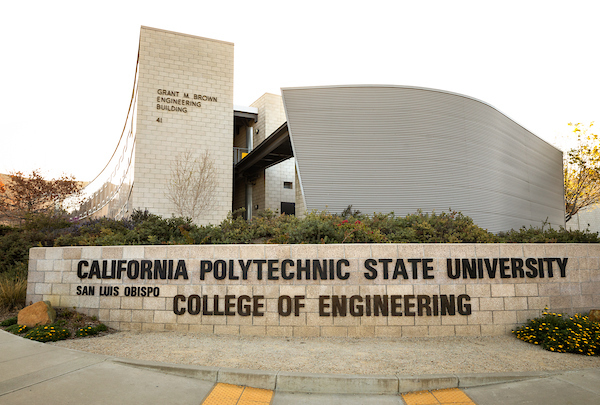Our mission

hands on and Fully accredited
The Civil Engineering (CE) and Environmental Engineering (ENVE) undergraduate degree programs are accredited by the Engineering Accreditation Commission (EAC) of ABET.
Our MissioN at cal poly civil engineering
To prepare its students for successful careers in civil engineering by providing a high-quality, practice-oriented education that emphasizes design project experiences, “hands-on” laboratory activities, and teamwork.
The Civil Engineering Program objectives
The Civil Engineering Program’s faculty, in consultation with engineering practitioners and alumni, have developed five educational objectives to support the program’s mission. The educational objectives represent the goals that we have for our graduates after they leave Cal Poly.
The educational objectives are as follows:
- Integrate principles of sustainability, resilience, and restoration into engineering solutions.
- Communicate and collaborate with diverse stakeholders in an inclusive, effective, equitable, and professional manner.
- Pursue life-long professional development through study, licensure, certification, leadership, and service.
- Implement systems thinking in engineering designs and solutions that promote public health, safety, and welfare on a local and global scale.
- Acknowledge, understand, and incorporate the needs of diverse and vulnerable populations in outreach and engineering practice.
Our MissioN at cal poly environmental engineering
To provide its students with the highest quality technical and professional education in environmental engineering, with particular emphasis in the areas of air pollution control, water and wastewater quality, solid and hazardous waste management, and noise control.
The environmental Engineering Program objectives
The Environmental Engineering Program’s faculty, in consultation with engineering practitioners and alumni, have developed five educational objectives to support the program’s mission. The educational objectives represent the goals that we have for our graduates after they leave Cal Poly. The educational objectives of the Environmental Engineering Program are as follows:
The educational objectives are as follows:
- Integrate principles of sustainability, resilience, and restoration into engineering solutions.
- Communicate and collaborate with diverse stakeholders in an inclusive, effective, equitable, and professional manner.
- Pursue life-long professional development through study, licensure, certification, leadership, and service.
- Implement systems thinking in engineering designs and solutions that promote public health, safety, and welfare on a local and global scale.
- Acknowledge, understand, and incorporate the needs of diverse and vulnerable populations in outreach and engineering practice.
The CE/ENVE program adopts the student outcomes associated with ABET’s Engineering Accreditation Commission.
- an ability to identify, formulate, and solve complex engineering problems by applying principles of engineering, science, and mathematics.
- an ability to apply engineering design to produce solutions that meet specified needs with consideration of public health, safety, and welfare, as well as global, cultural, social, environmental, and economic factors.
- an ability to communicate effectively with a range of audiences.
- an ability to recognize ethical and professional responsibilities in engineering situations and make informed judgments, which must consider the impact of engineering solutions in global, economic, environmental, and societal contexts.
- an ability to function effectively on a team whose members together provide leadership, create a collaborative and inclusive environment, establish goals, plan tasks, and meet objectives.
- an ability to develop and conduct appropriate experimentation, analyze and interpret data, and use engineering judgment to draw conclusions
- an ability to acquire and apply new knowledge as needed, using appropriate learning strategies.
Diversity, Inclusion, and Respect
All individuals in our department will treat each other with respect and dignity. Dimensions of diversity, including race, ethnicity, national or regional origins, socioeconomic status, gender and gender identity, sexuality, class, and religion, enhance and enrich intellectual discussion and creative problem-solving. By being open to new ideas and showing respect for diverse points of view, we support a climate that values all students. More information on Cal Poly’s commitment to diversity and inclusion can be found on the University Office of Diversity and Inclusion webpage.

Academic Integrity
Cal Poly does not tolerate academic cheating or plagiarism in any form. We address instances of academic dishonesty as both an academic issue in the course in which it happens and a disciplinary incident under the CSU Standards for Student Conduct. Cheating is defined as obtaining credit or improved evaluations of course performance for yourself or others by dishonest or deceptive means. Plagiarism is defined as the deliberate use of someone else’s language, ideas, or other original material and claiming it as your own through lack of appropriate citation. You are responsible for knowing the Academic Honesty Policy, and can find the full description of the process for addressing cheating or plagiarism in document AS-722-10 Resolution on Academic Dishonesty.
